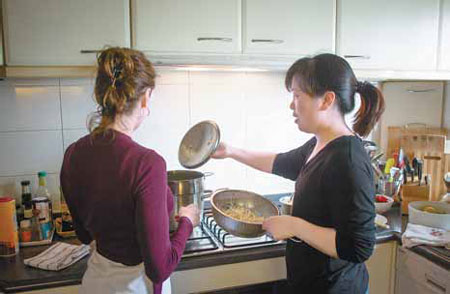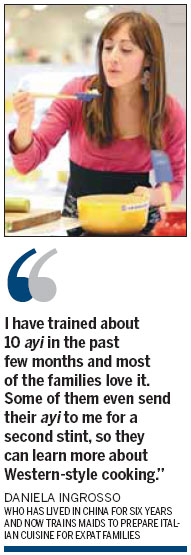
|
Xue Qianchun, 35, an Anhui native, has worked for many Shanghai-based expats during the past 10 years. Photos by Gao Erqiang / China Daily |
|
Above and below: The basic requirements for ayi include cooking, cleaning and doing laundry. |


Better skills give ayi an edge with expat families, Xie Yu reports in Shanghai.
Xue Qianchun, 35, carefully used a chef's knife to chop bell peppers and onions. After that, she put some ginger into a food processor and reduced the spice to powder.
"Indian cuisine places great emphasis on the use of a lot of seasoning. For example, I use lemon juice instead of vinegar to impart a sour taste to cooked rice," said Xue, as she added oil to a pan and sauteed cardamom, cinnamon, cloves and bay leaves.
If this image makes you think that Xue is an Indian chef, you would be wrong. She is actually an ayi, the Chinese word for maid, with long experience working for foreign families in Shanghai.
Xue's colorful story is one of determination, the type that could prove inspirational to anyone from a poor family and lacking a college education.
After 10 years in the service industry, Xue has worked for people from countries such as France, the United Kingdom, South Korea, Italy, Belgium and the United States. Her two part-time jobs bring in a combined income of 7,000 yuan ($1,140) a month, higher than that of many junior office workers in Shanghai.
In 1999, Xue and her husband moved to Shanghai from Anhui province in East China and she became a street cleaner. Her working day began at 6 am and ended 12 hours later. She worked six days a week for a mere 600 yuan per month.
She remembers clearly how things started to change.
"My first foreign client was from the Philippines. At that time I had no idea how to use an electric vacuum cleaner and I only knew a few words of English," she said.
Her most nerve-wracking moment was when she realized she couldn't understand the instructions her boss had given her, so Xue used all her spare time to study English. She took notes and ran through them in her mind when she was riding her bike or at the food market, sometimes even in her dreams.
"Every one laughed at me. They asked me if I was crazy, and if I was going to take the college entrance exam," she said. Working for expats, known in Chinese as laowai, is actually more demanding than working for regular Chinese families, according to Xue.
The basic requirements include cleaning the bathroom and scrubbing floors every day. At least once a week, the ayi does the family laundry and irons bed sheets. Work in the kitchen is challenging, too; maids have to learn about Western seasonings, which often make no sense to them at the beginning. However, since she began working as an ayi, Xue has learned to prepare a variety of Western dishes, including basil pesto, avocado dip, bell-pepper rice, and red-chilli beef.